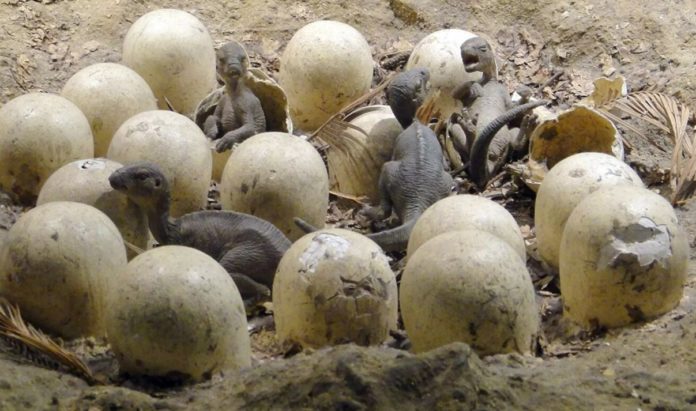An international team of scientists made a totally extraordinary discovery: they discovered the fossilized remains of a dinosaur that supposedly died protecting its offspring.
The fossils, found outside the Chinese city of Ganzhou, belong to the species of bird-like theropod dinosaurs dubbed oviraptorosaur. These reptiles inhabited the Earth more than 66 million years ago, during the Cretaceous period.
- Does This Mean We Stopped Being Animal and Started Being Human Due to ‘Copy Paste’ Errors?
- The One Lifestyle Choice That Could Reduce Your Heart Disease Risk By More Than 22%
- Aging: This Is What Happens Inside Your Body Right After Exercise
- Immune-Boosting Drink that Mimics Fasting to Reduce Fat – Scientists ‘Were Surprised’ By New Findings
- Gun Violence in America: What They Don’t Talk About at the Debate
The specimen found in China was sitting on a nest of more than two dozen eggs at the time of its death. Interestingly, at least seven eggs preserved skeletal remains or embryos of the Oviraptorosaur, something that suggests that these dinosaurs incubated their nests in the same way that contemporary birds do.
???? A dinosaur fossil of an oviraptorid was found protecting 24 eggs – some of them fully formed. pic.twitter.com/Lik8aJS5JR
— Nature is Lit (@Nature_Is_Lit) March 11, 2021
This is the first time paleontologists have found the remains of a non-avian dinosaur sitting in a nest of eggs that preserve embryos.
“In the new specimen, the babies were almost ready to hatch,” explains one of the study’s authors, Matt Lamanna, from the Carnegie Museum of Natural History in Pittsburg (USA).
“This dinosaur was a loving father who died while raising his young,” emphasizes the researcher.
During the study, Chinese and American paleontologists also carried out oxygen isotope analysis and concluded that the eggs were incubated at temperatures similar to those of birds. Paradoxically, not all babies were at the same stage of development. According to one of the hypotheses, some of the embryos were simply closer to the relative and this was what helped them to mature faster.
The groundbreaking find also helped shed light on the species’ diet. For the first time, researchers discovered small stones in the dinosaur’s abdomen. The authors of the study believe that these are so-called gastroliths, or stomach stones, which the animal would have swallowed to improve digestion.
- Does This Mean We Stopped Being Animal and Started Being Human Due to ‘Copy Paste’ Errors?
- The One Lifestyle Choice That Could Reduce Your Heart Disease Risk By More Than 22%
- Aging: This Is What Happens Inside Your Body Right After Exercise
- Immune-Boosting Drink that Mimics Fasting to Reduce Fat – Scientists ‘Were Surprised’ By New Findings
- Gun Violence in America: What They Don’t Talk About at the Debate
“It is extraordinary to know how much biological information a single fossil can contain. We are going to learn from this specimen for many more years,” says paleontologist Xing Xu, from the Institute of Vertebrate Paleontology and Paleoanthropology in Beijing.
